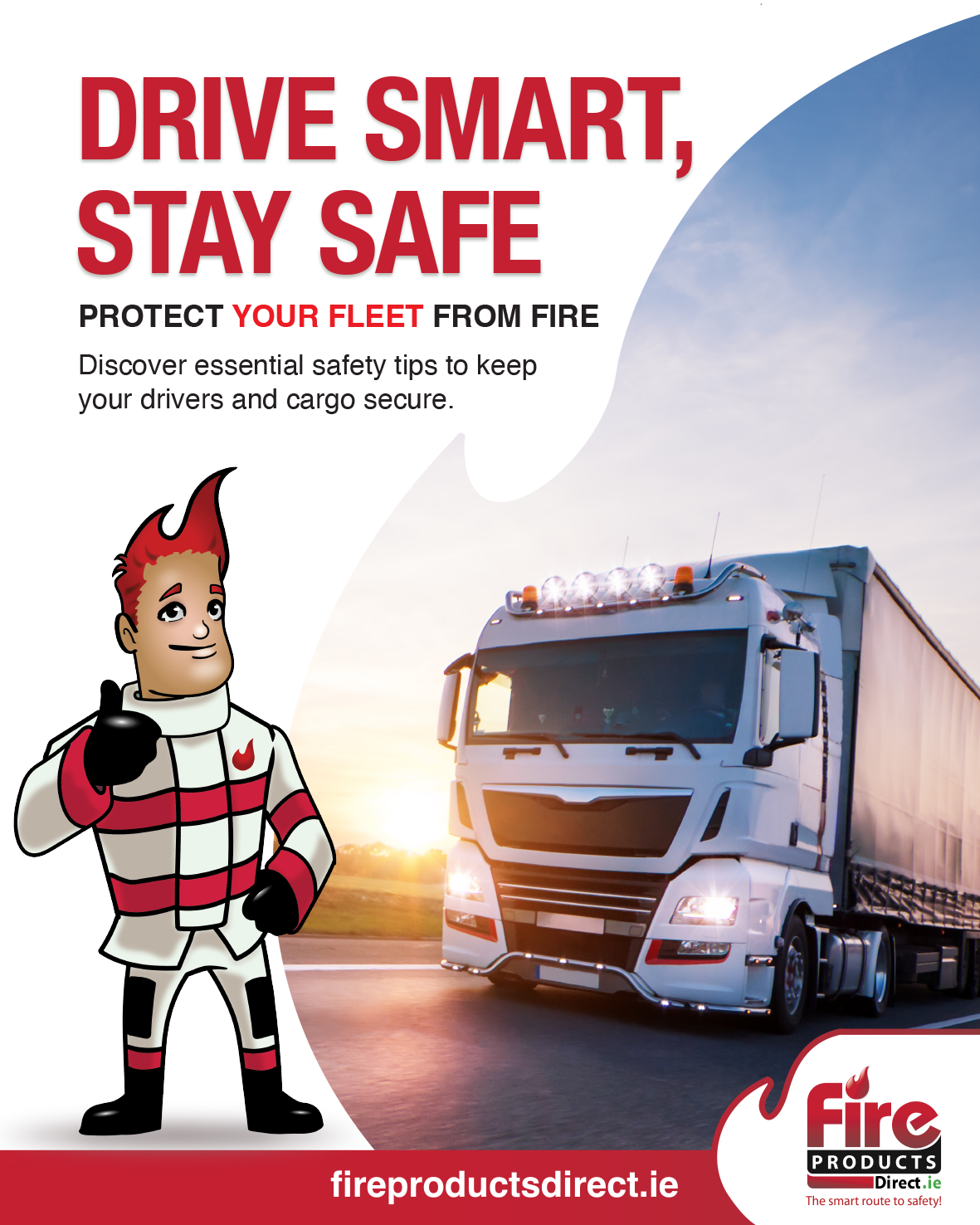
Ensuring fire safety in trucks and lorries is crucial for protecting drivers, cargo, and other road users. For those with responsibility for such vehicles, understanding potential fire risks, preventive measures, and regulatory requirements in Ireland is essential.
Potential Fire Risks in Trucks and Lorries
- Electrical Faults: Faulty wiring, overloaded circuits, or malfunctioning components can lead to electrical fires.
- Engine Overheating: Insufficient cooling or mechanical failures may cause the engine to overheat, increasing fire risk.
- Fuel Leaks: Leaks from fuel lines or tanks can result in highly flammable conditions.
- Brake Issues: Overheated brakes due to excessive use or poor maintenance can ignite fires.
- Carriage of Flammable Goods: Transporting hazardous materials without proper precautions elevates fire hazards.
Preventive Measures
- Regular Maintenance: Conduct thorough inspections and maintenance of electrical systems, engines, fuel lines, and brakes to identify and rectify potential issues promptly.
- Proper Storage of Flammable Materials: Ensure that any flammable goods are stored securely and in compliance with safety guidelines to prevent accidental ignition.
- Driver Training: Educate drivers on fire prevention techniques, emergency procedures, and the proper use of fire safety equipment.
Regulations in Ireland
In Ireland, the Road Safety Authority (RSA) oversees vehicle safety and legislation for buses, trucks, and trailers. While specific fire safety equipment requirements for trucks and lorries are not explicitly detailed in the available sources, general safety obligations under the Safety, Health and Welfare at Work (General Application) Regulations 2007 apply. These include provisions for fire detection and firefighting equipment, maintenance of emergency routes and exits, and ensuring employee safety.
For vehicles transporting hazardous materials, compliance with the European Agreement concerning the International Carriage of Dangerous Goods by Road (ADR) is mandatory. This includes specific requirements for fire safety equipment and procedures. Here is a link to information on the ADR – ADR – transport of dangerous goods information from the HSA
Section 8.1.4 of the ADR specifies fire extinguisher requirements for transport units carrying dangerous goods.
| (1)
Transport unit maximum permissible mass |
(2)
Minimum number of fire extinguishers |
(3)
Minimum total capacity per transport unit |
(4)
Extinguisher suitable for engine or cab fire. At least one with a minimum capacity of: |
(5)
Additional extinguisher(s) requirement. At least one extinguisher shall have a minimum capacity of: |
| ≤ 3.5 tonnes | 2 | 4 kg | 2 kg | 2 kg |
| > 3.5 tonnes ≤ 7.5 tonnes | 2 | 8 kg | 2 kg | 6 kg |
| >7.5 tonnes | 2 | 12 kg | 2 kg | 6 kg |
| The capacities are for dry powder devices (or an equivalent capacity for any other suitable extinguishing agent). | ||||
Note that transport units carrying dangerous goods in accordance with the ‘small load exemption (ADR 1.1.3.6) shall be equipped with one portable fire extinguisher with a minimum capacity of 2 kg dry powder (or an equivalent capacity for any other suitable extinguishing agent).
Essential Fire Safety Equipment
To enhance fire safety in trucks and lorries, consider equipping vehicles with the following:
- Fire Extinguishers: Install appropriate fire extinguishers, ensuring they are easily accessible.
- Smoke Detectors: While not commonly mandated, installing smoke detectors can provide early warning of fires, especially in sleeper cabs.
- Fire Blankets: Fire blankets are useful for smothering small fires or providing protection during evacuation.
- Emergency Hammers: Facilitate quick evacuation by allowing occupants to break windows if necessary.
What to Do if a Fire Starts
- Stay Calm: Panic can hinder effective action
- Pull Over Safely: Stop the vehicle in a safe location away from traffic
- Turn Off the Engine: Cut the power to reduce the risk of fuel feeding the fire
- Evacuate: Exit the vehicle promptly and ensure all occupants are at a safe distance
- Call Emergency Services: Dial 999 or 112 for emergency services to report the incident and seek assistance
- Use Fire Extinguisher: If trained and it’s safe to do so, attempt to extinguish the fire using the appropriate extinguisher
Prioritising fire safety in trucks and lorries is vital for the well-being of drivers and the protection of goods. By understanding potential risks, adhering to regulations, and equipping vehicles with the necessary fire safety equipment, professionals can significantly mitigate fire hazards on the road.
For high-quality fire safety equipment tailored for commercial vehicles, explore our range of products designed to keep your fleet safe and compliant with Irish regulations.
Please do feel free to contact our team for advice on the fire safety equipment you may need for your trucks or lorries on 051 448389.
Be Smart. Be Prepared. Be Safe.







